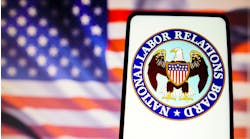NLRB Reverses Joint Employer Ruling Over Putative Conflict of Interest
The National Labor Relations Board reversed a ruling from late last year that had overturned an Obama-era decision on joint employer status because of an alleged conflict of interest on the part of one of its new Republican members.
The December vote had reversed a decision by the previous board that extended joint employer liability to labor issues. In 2015, the NLRB held that two employers—such as staff leasing companies and franchisees—are joint employers if one employer has indirect control or rights of control, even when those rights have never been exercised.
This would allow independent contractors, leased and temp employees to vote alongside the regular workforce on whether to unionize, for example. It is the basis on which unions are trying to organize large-scale franchisors, such as fast-food giant McDonald’s. A court pressing the union’s case for organizing the burger chain on this basis was pending when the new joint employer decision was made.
That 2015 decision involved several employers’ cases gathered together under the name of one of them: Browning Ferris Industries (BFI). Two years later the policy was changed by the temporary Republican majority created in the few weeks between two new Republican board members taking their seats and the retirement of the Republican acting chairman Philip Miscimarra last December.
In the new year things got sticky. Alerted by union-friendly members of Congress (who most likely had been clued in by unions), NLRB inspector general David Berry, who had been appointed during the Obama era, reported that board member William Emanuel should have recused himself because his former law firm, Littler Mendelson, had represented one of the companies involved in the original Browning Ferris case
However, the December decision reversing the previous joint employer policy did not directly involve BFI or any of the other companies who were part of the 2015 decision. Instead, last December’s case involved an entirely different company called Hy-Brand Industrial Contractors, which had never been a client of Littler Mendelson.
Because the five-member board is now down to two Democrats and two Republicans, even when the new Republican nominee John Ring is confirmed by the Senate—expected to happen as soon as this week—with Emanuel’s recusal the board will remain deadlocked in regard to the joint employer issue.
Possible Recusal Workarounds
There are three possible avenues for getting around the recusal. NLRB general counsel Peter Robb has asked the Washington, D.C., Circuit to reopen its review of the Browning-Ferris case, which could result in its reversal. Also, the Senate could approve a bill that already has passed the House that would overturn the Browning-Ferris decision.
In addition, the five-year term of Democrat board member Mark Gaston Pearce will expire on August 27. With Ring’s presence on the board, that will once again create a Republican majority of 2-1 even with Emanuel’s continued recusal, and the board will be able to maintain the minimum number of members required for a quorum even with Pearce’s seat unfilled.
The Emanuel recusal allowed Democrat legislators to turn the switch on their rhetoric all the way up to high dudgeon. “A big ethics cloud hangs over the NLRB,” declared Sen. Elizabeth Warren (D-Mass.), who serves on the committee that conducts oversight of the board. She and Sen. Patty Murray (D-Wash.) also sent a letter to Emanuel asserting that “you directly participated in an extraordinarily consequential decision from which the law required your recusal.”
Warren also used the Emanuel recusal to browbeat NLRB nominee John Ring during his March 1 confirmation hearing, drawing a promise from him that he would recuse himself from any board decisions involving his former law firm of Morgan, Lewis & Bockius, which represents many companies dealing with federal labor legal issues.
Whether Emanuel’s recusal was even necessary has been questioned. Some critics note that former Obama-era board member Craig Becker stubbornly refused to recuse himself from cases involving his previous employer, the Service Employees International Union (SEIU), where he had served as associate general counsel, even in the face of repeated demands that he do so.
It also has not gone without notice that IG Berry remained silent regarding multiple accusations pointing out Pearce’s ongoing conflicts, as did the same members of Congress complaining loudly now about Emanuel.
Former Speaker of the House Newt Gingrich observed, “The same NLRB inspector general didn’t seem to have any problem when former Obama appointee Craig Becker made rulings on cases in which chapters of the SEIU were involved.”




